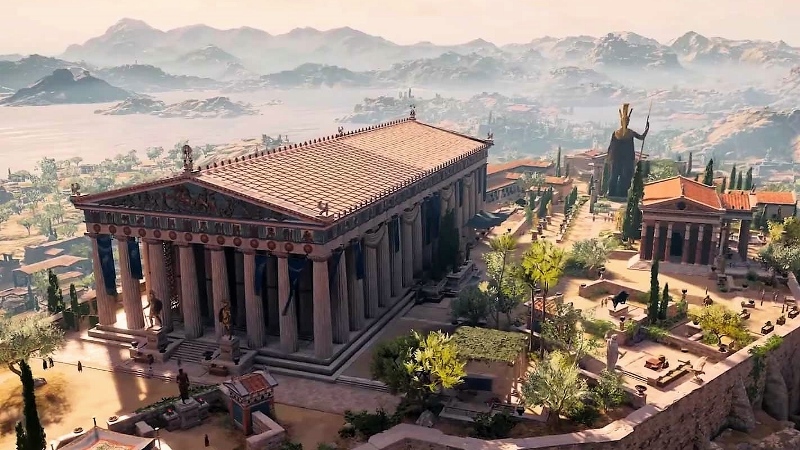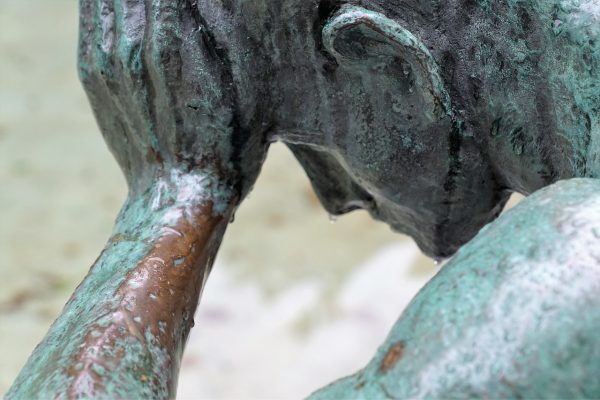The Story of Those Who Came Before: Ancient Greece
Ancient Greece, the mother to philosophical thought, mathematics, the alphabet, the Olympics, extremely great seafood, and much more. This great civilization was filled with distinct minds, societies, and ideas. However, two of their more famous aspects of their culture is mythology and religion. This article is going to be the first in a series of articles that will focus on Ancient Greece and its society.
Overview
The religion in ancient Greece is relatively simple, it is a polytheistic religion meaning belief in more than one god. The Greeks had a variety of gods and worshiped them in many distinct ways. The gods consisted of groups, primarily the groups referred to were the Olympians and the Titans. These gods had control over many different aspects of life on earth. The Greeks treated them as a higher race of humans in the sense that they could still be kind, mean, angry, pleasant, cruel or loving. They fell in love with each other, argued with each other, and even stole from each other.
The Origin/Pre-Olympian age
The Greeks had an origin story for their religion as do most religions on earth. They had something called the “Myths of Origin” or the “Creation Myths,” which were meant to explain the beginnings of the universe. It began with Chaos the god of creation, after him followed Gaia (the Earth) and several others: Eros (Love), the Abyss (the Tartarus), and the Erebus. Gaia gave birth to Uranus (the Sky), who then bonded with her.
From their union came 12 children the Titans. 6 males: Coeus, Crius, Cronus, Hyperion, Iapetus, and Oceanus, and 6 females: Mnemosyne, Phoebe, Rhea, Theia, Themis, and Tethys. Cronus was the last Titan, after his birth Gaia and Uranus decreed no more Titans where to be born. But despite this, the Giants sometimes known as the Hundred-Handed Ones, which included the Cyclops, where created. Uranus didn’t like this and threw them into Tartarus which is basically the equivalent of hell for the Titans. Gaia was furious and convinced Cronus to castrate his father. Which made him the king of the Titans, with his sister-wife Rhea as his consort, and the other Titans as his court.
The Time of the Olympians
Since Cronus had betrayed his father, he feared that his offspring would do the same, and so each time Rhea gave birth, he snatched up the child and ate it. Rhea hated this and tricked him by hiding her final child Zeus, letting Cronus eat a stone instead. When Zeus was full grown, he poisoned Cronus which caused him to vomit, throwing up Rhea’s other children Hades, Poseidon, Demetris, and Hestia. Then he challenged Cronus to a war, for the throne of the gods. With the help of his siblings, Zeus won trapping his father and Titans in Tartarus.
Zeus married his sister-wife Hera and had 4 kids named: Athena, Ares, Hebe, and Hephaestus. He also had an affair with the goddess Demeter and had Persephone. These gods became the known as the 12 Olympians.
The List of Gods
Zeus- King of Gods resided at Mount Olympus, god of the air and could control the weather. His weapon was a lightning bolt.
Hades- God of the Underworld/God of the Dead, the eldest son of Cronus, resided in the underworld. Not and Olympian, didn’t live on Mount Olympus
Poseidon- middle child of Cronus, Hades older, Zeus younger. God of the Sea/Ocean also on occasion referred to as the God of Horses. Had power of the seas. Greeks often prayed to Poseidon to have a calm journey on the Mediterranean. A storm meant Poseidon was not happy with them.
Hera- Wife of Zeus and queen of all gods. Goddess of weddings, women, marriage, childbirth and family. Greeks prayed to her for good blessings on their wedding day.
Aphrodite- the goddess of love and beauty. She was the wife of Hephaestus but was in love with the war god Ares.
Athena- Goddess of war and wisdom. During times of war the Greeks would pray to Athena, so they could win battles.
Apollo- god of the sun, truth, music, poetry, dance and healing. Poets and bards put themselves under his protection.
Demeter- the goddess of fertility and agriculture. She was an important goddess for farmers and women.
Hermes- god of travel, business, weights and measures and sports. He was the messenger of the gods and guided the souls of the dead to the underworld.
Artemis- goddess of hunting, archery and childbirth. Also, the goddess of wild animals. Had the ability to send plagues or sudden death to mortals, but she could also heal them. She was the twin sister of the god Apollo.
Ares- the god of war. However, unlike Athena, he was not very cunning in battle. He was not a popular god (least popular of the Olympians).
Hephaestus- the god of fire, volcanoes, blacksmiths and craft-workers. Often seen as the one who forged the weapons of the gods (Zeus’s lightning bolt, Poseidon’s trident, etc).
Dionysus- god of wine, and of high spirits. Greeks loved wine, he was sort of their party god.
Temples and Worship
In Greek religion each city or society, built temples in honor of the gods. Each city had a number of temples, for a certain number of gods. The temples worked as banks where citizens were able to come and deposit or withdraw funds. However, unlike banks today, they gave withdrawals using their own money. For they represented the will of the gods. People would come give offerings to the gods which included gold, jewels, treasures, etc., and in exchange the priests at the temples would pray for them and bring offerings such as sacrifice of animals on behalf of the citizens. Also, citizens would come to pray to the gods on their own. The system was very similar to that of the Vatican Church (Catholic Church) except they only have one god.
As for the actual buildings that were the temples, they were large buildings, with columns. Usually the buildings would contain around two rooms. One room which held the statue of the god the temple was dedicated too, where people could come and prey. The other room was to hold all the offerings deposited by the people, so they would be easily reachable to be used either to give citizens withdrawals or for the priests to use in the name of the gods. The most famous temple in Greek history by far is the Parthenon, located in the Acropolis in Athens. Which held a Bronze statue of the goddess of war, Athena which took Athenians a fortune to make. It totaled 500 million U.S dollars today, this shows the how important the gods were to Ancient Greek society.











